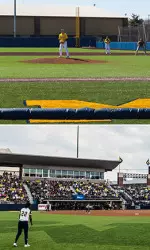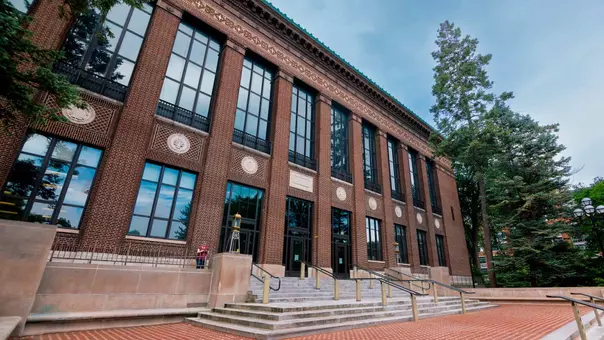
Our Venue Namesakes: The Wilpon Complex
2/10/2016 12:00:00 AM | General
Feb. 10, 2016

This four-part series focuses on the men and women who helped shape the Stephen M. Ross Athletic Campus. The final entry focuses on the Wilpon Complex, home to Ray Fisher Stadium and Alumni Field.
Fred Wilpon, co-founder and chairman on the board of Sterling Equities and majority owner of the New York Mets, graduated with a B.A. from the University of Michigan in 1958. Wilpon came to Michigan on a baseball scholarship, though he tore his rotator cuff early in his collegiate career. He was unable to play as a sophomore due to his injury. Worried about occupying a scholarship while injured, Wilpon considered leaving the team until Michigan head coach Ray Fisher suggested he remain on the team. After he failed to fully recover from his injury during his junior year, Fisher assisted Wilpon in receiving financial aid equivalent to his scholarship to pay for his remaining two years of school.
During Wilpon's time at the University of Michigan, he met his eventual wife, Judy Kessler, who also graduated from the University in 1958. Becoming the majority owner of the New York Mets in 2002, Wilpon later made a donation to the University to help renovate both Ray Fisher Stadium, named after his former coach and home of the baseball team, and the softball team's Alumni Field. As a result, the fields were made a part of the Wilpon Baseball and Softball Complex.
RAY FISHER STADIUM -- RAY FISHER (Baseball, 1921-1958)
Ray Fisher's professional baseball career began in 1910 after playing at the collegiate level, when he was signed to play for the New York Highlanders, which became the Yankees in 1913. He played in New York before finishing his playing career on the Cincinnati Reds. On the Reds, Fisher pitched Game 3 of the infamous 1919 World Series. Despite compiling a career record of 100-94 and a 2.82 earned run average, Fisher immediately applied to be the baseball coach at the University of Michigan when the position became available in 1921. Fisher applied at the recommendation of Branch Rickey, the baseball executive who would eventually sign Jackie Robinson. Rickey had received a law degree from the University of Michigan.

When Fisher became Michigan's baseball coach, he breached his contract with the Reds, coming to Michigan because the job offered a more lucrative opportunity. As a result, the commissioner of Major League Baseball placed Fisher on a "blacklist," banning him from the league. Fisher would later become one of the only known players to have a lifetime ban from baseball overturned.
As Michigan's baseball coach, Fisher coached for 38 seasons, leading the Wolverines to an appearance in the College World Series in 1953. He was named Coach of the Year that same year. Upon signing on as the baseball coach, Fisher also agreed to become an assistant basketball coach, a position he held until 1941, and an assistant football coach, a position he held until 1945. Fisher finished his career as Michigan's baseball coach with a .694 winning percentage and 661 wins. In 1923, Fisher became Michigan's first coach to racially integrate a varsity sport. As Michigan's coach, he was hailed by the media as "The Fielding Yost of the Diamond."
Fisher was inducted into the Michigan Sports Hall of Fame in 1959, the American Association of College Baseball Coaches Hall of Fame in 1966 and the University of Michigan Athletic Hall of Honor in 1979, among other notable distinctions. Fisher's number has been retired by the Michigan baseball team and on May 23, 1970, the Michigan baseball stadium was named Ray Fisher Stadium. The stadium was renovated in 2008 as a part of the Wilpon Baseball and Softball Complex, which was named after one of Fisher's former pitchers, Fred Wilpon.
ALUMNI FIELD
Built in 1982, Alumni Field is the home to the University of Michigan's softball team. In addition to the stadium's 1,800-seat grandstand, the stadium was renovated to include bleachers beyond the right field wall, adding an additional 1,000 seats. Following the 1998 season, new outfield grass and an infield/outfield drainage system were completed. The outfield grass, however, was replaced with AstroTurf prior to the 2014 season. The stadium was most recently renovated that year, when a brand new, three-story Donald R. Shepherd Softball Center was installed as a part of enhancements to the Wilpon Complex. A state-of-the-art video board was also added to left field in 2014.

Temporary lights were first added to Alumni Field in 2002 and became a permanent fixture in 2003. The Wolverines finished 4-0 in the 2002 NCAA Regional, though did not play a night game during that regional. As a result, Michigan did not play its first-ever home night game at Alumni Field until April 23, 2003.
Alumni Field has hosted 17 NCAA Regional Championships and four NCAA Super Regionals. The longest home winning streak in Michigan softball history started on March 28, 2009, and continued through May 23, 2010, spanning 36 games. Entering the 2016 season, Michigan's all-time record at Alumni Field is 511-132-1.
Previous Entries
• Part One -- Phyllis Ocker, Bennie Oosterbaan
• Part Two -- Cliff Keen, Don Canham
• Part Three -- Fritz Crisler, Fielding Yost
The 2015-16 academic year marks the 150th anniversary of Michigan Athletics. We invite the University of Michigan family to celebrate the passion that fuels us, rediscover the stories and traditions that unite us, and imagine what the future holds for us. We look forward to celebrating "This Michigan of Ours." To share a memory of Michigan Athletics, please fill out our online form or email goblue150@umich.edu.










